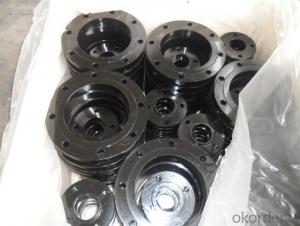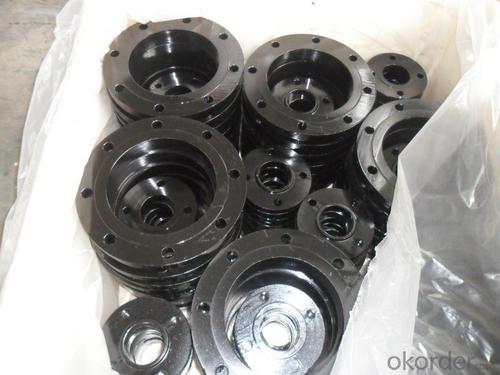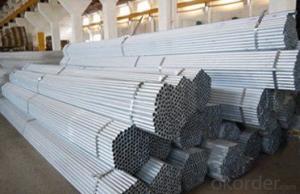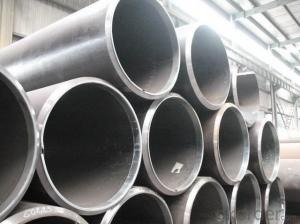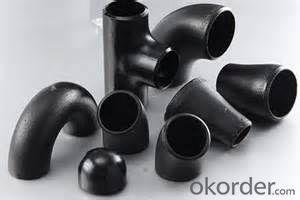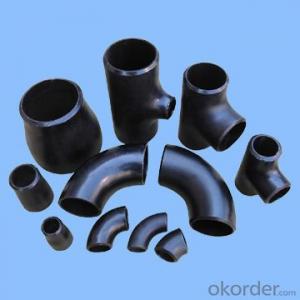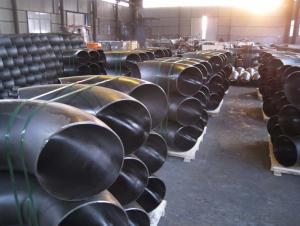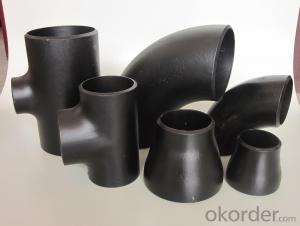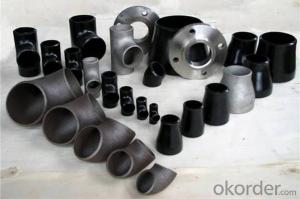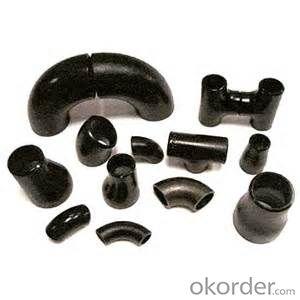CARBON STEEL PIPE FITTINGS ASTM A234 FLANGE 12''
- Loading Port:
- Tianjin
- Payment Terms:
- TT OR LC
- Min Order Qty:
- 1 m.t.
- Supply Capability:
- 30000 m.t./month
OKorder Service Pledge
OKorder Financial Service
You Might Also Like
Specifications
1.we produce seamless steel pipe
2.size:48-219*4.5-45mm
3.ISO 9000 approved
4.Market:south/east Asia,Mid-east,South America
seamless steel pipe
Material J55 K55 N80 L80 P110.etc
Standard ASTM JIS
Usage conveying oil gas ,oil pipe line,pipe material collar,oil nature gas,
Packing wooden cases or wooden pallet ,export standard package
Others:Special design available according to requirement
Anti-corrosion available and high temperature resistence
Delivery time 30days
Payment term T/T L/C
Name | API oil casing pipe | ||||
Out Diameter | Wall thickness | Material | Thread | Length | |
in | mm | ||||
5 1/2 | 139.7mm | 6.20 | J55/K55/N80 | LTC/STC/BTC | R2 |
6.98 | |||||
7.72 | |||||
9.17 | |||||
10.54 | |||||
6 5/8 | 168.28mm | 7.32 | J55/K55/N80 | LTC/STC/BTC | R2 |
8.94 | |||||
10.59 | |||||
12.06 | |||||
12.06 | |||||
8 5/8 | 219.08 | 8.94 | H40 | S/L/B | 9 5/8R2 |
J55/K55 | S/L/B | ||||
10.6 | L80 | L/B | |||
12.7 | L80 C95 | L/B | |||
14.15 | P110 | L/B | |||
9 5/8 | 244.48 | 13.84 | J55 K55 | R2 | |
15.11 | L80 | L/B | |||
10 3/4 | 273.05 | 11.43 | J55 K55 | S/B/E | R2 |
13.84 | P110 | S/B | |||
15.11 | P110 | S/B | |||
11 3/4 | 298.45 | 12.19 | J55 K55 | S/B | R2 |
10.96 | J55 K55 | S/B | |||
13 3/8 | 339.72 | 12.19 | J55 K55 L80 | S/B | R2 |
10.92 | J55 K55 | S/B | |||
13.06 | L80 | S/B | |||
Coupling and thread can be required according to customer requirment
- Q: How are steel pipes insulated for thermal applications?
- Steel pipes are commonly insulated for thermal applications using various materials such as fiberglass, mineral wool, or foam insulation. These insulating materials are typically wrapped around the steel pipes to create a protective barrier that reduces heat transfer. Additionally, a vapor barrier may be installed to prevent moisture condensation. This insulation helps to maintain the desired temperature of the fluid or gas being transported through the pipes and prevents energy loss.
- Q: How are steel pipes coated for protection?
- Steel pipes are commonly coated for protection through a process called galvanization. This involves immersing the pipes in a bath of molten zinc, creating a protective layer that prevents corrosion and extends their lifespan. Additionally, other methods such as epoxy coatings or polyethylene wrappings can be used to provide additional protection against external factors.
- Q: How do steel pipes perform in extreme temperature variations?
- Steel pipes are designed to perform well in extreme temperature variations. Due to their high tensile strength and thermal conductivity, steel pipes can withstand both high and low temperatures without significant changes in their structural integrity. However, it is important to note that extreme temperature variations may cause slight expansion or contraction of the steel pipes, which could potentially lead to minor changes in their dimensions.
- Q: What are the different end finishes available for steel pipes?
- There are several different end finishes available for steel pipes, depending on the specific application and requirements. Some of the most common end finishes include: 1. Plain End: This is the simplest and most common type of end finish, where the pipe ends are cut square and left plain without any additional treatment or threading. 2. Beveled End: A beveled end is an angled cut made at the end of the pipe, usually at a 30-degree angle. This allows for better welding and ensures a smooth transition between pipes. 3. Threaded End: Threaded ends are commonly used for pipes that need to be connected with other components using threaded fittings. The ends of the pipe are cut with external threads, allowing for easy assembly and disassembly. 4. Coupling End: Similar to threaded ends, coupling ends have internal threads instead of external threads. This allows for the connection of pipes using couplings or connectors. 5. Grooved End: Grooved ends are commonly used for pipes in fire protection systems or other applications that require quick and easy installation. The ends of the pipe are grooved, and then a coupling is used to connect and secure the pipes. 6. Flanged End: Flanged ends have a flat, wide surface with holes for bolts. This type of end finish is used when the pipe needs to be connected to other components using flanges, such as in piping systems or equipment connections. Each of these end finishes serves a specific purpose and is chosen based on the requirements of the application. The end finish selected will depend on factors such as the type of connection needed, the pipe's intended use, and the specific industry standards and regulations that apply.
- Q: What are the different sizes of threads available for steel pipes?
- The different sizes of threads available for steel pipes include standard pipe threads such as NPT (National Pipe Taper) and NPS (National Pipe Straight), as well as metric pipe threads like MPT (Metric Pipe Taper) and MPS (Metric Pipe Straight). These sizes can vary from 1/8 inch all the way up to several inches in diameter, depending on the specific application and industry requirements.
- Q: What are the different types of coatings used for steel pipes?
- There are several types of coatings used for steel pipes, including epoxy coatings, polyethylene coatings, fusion bonded epoxy coatings, and zinc coatings. Each type of coating offers different benefits and is used for specific applications to protect the steel pipes from corrosion and improve their durability.
- Q: Can steel pipes be used for heat exchangers?
- Yes, steel pipes can be used for heat exchangers. Steel is a commonly used material for heat exchangers due to its high thermal conductivity and durability. It can efficiently transfer heat between two fluids, making it suitable for various industrial applications.
- Q: DN150 welded steel tubes one meter multiple
- The theoretical weight table of welded steel pipe (Kg) can be checked, and the outer diameter and wall thickness can be measured according to the formula.For example: DN150 welded steel pipe, diameter 165mm, thickness 4.5mm, weight kg per meter.Welded steel pipe theoretical weight (Kg/m) = (165-4.5) * 4.5 * 0.02466=17.81Kg
- Q: What is PE coated steel pipe? Seek explanation
- PE coating on the inner wall of steel pipe steel pipe is covered with a layer of polyethylene plastic polymer, PE, polyethylene (Polyethylene of raised temperature is the abbreviation of resistance English), the scope of application of the general PE pipe water supply pipe to a temperature below 40 DEG C, cannot be used for hot water transmission pipeline.
- Q: What is the difference between internal threading and external threading of steel pipes?
- The difference between internal threading and external threading of steel pipes lies in the location and method of threading. Internal threading refers to the process of creating threads on the inside surface of a steel pipe, allowing it to be connected to other components with external threads. On the other hand, external threading involves creating threads on the outside surface of a steel pipe, enabling it to be joined with components having internal threads. These two methods serve different purposes and are utilized depending on the specific requirements of the plumbing or assembly project.
Send your message to us
CARBON STEEL PIPE FITTINGS ASTM A234 FLANGE 12''
- Loading Port:
- Tianjin
- Payment Terms:
- TT OR LC
- Min Order Qty:
- 1 m.t.
- Supply Capability:
- 30000 m.t./month
OKorder Service Pledge
OKorder Financial Service
Similar products
Hot products
Hot Searches
Related keywords
